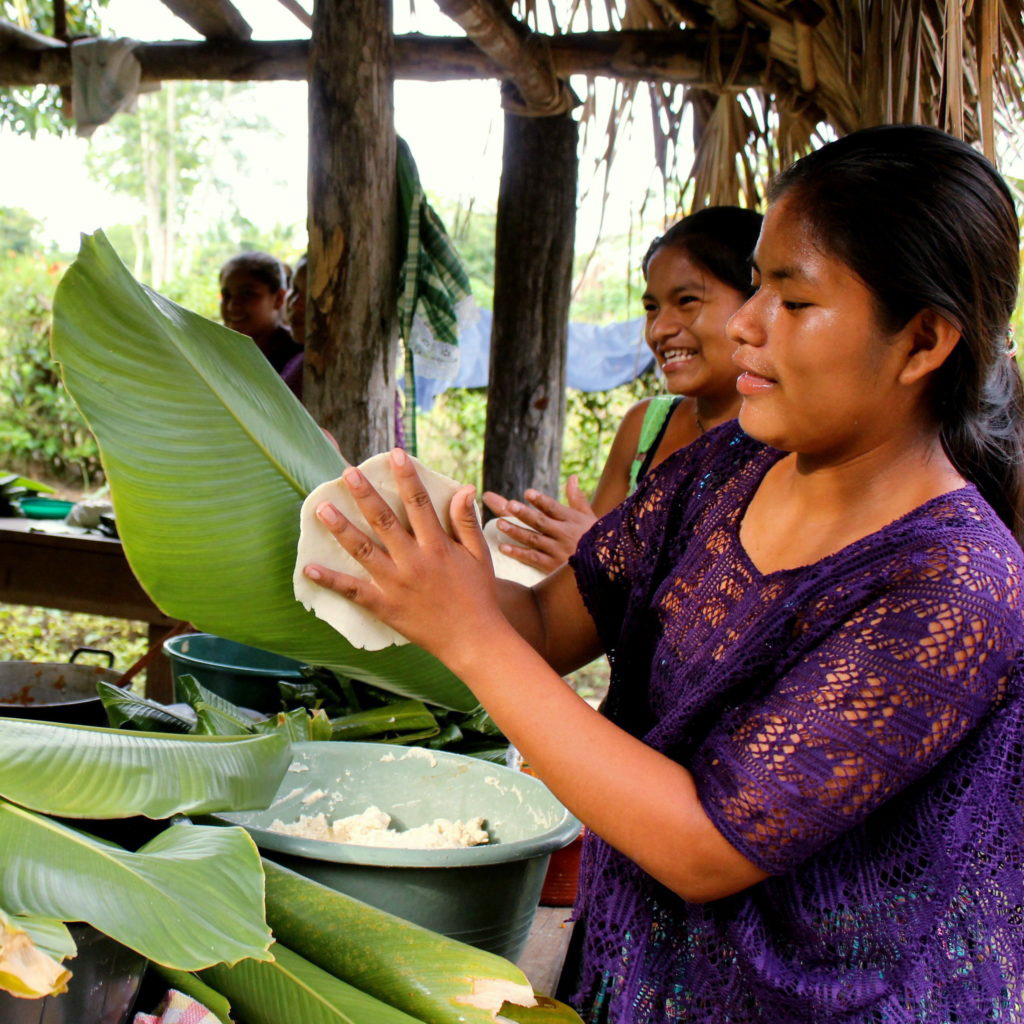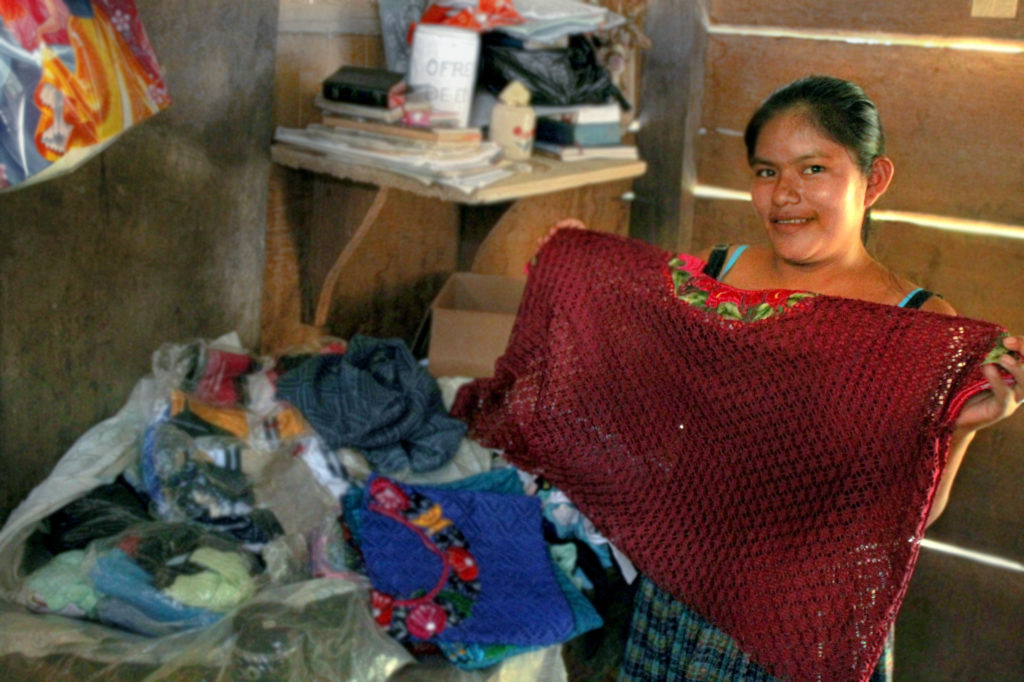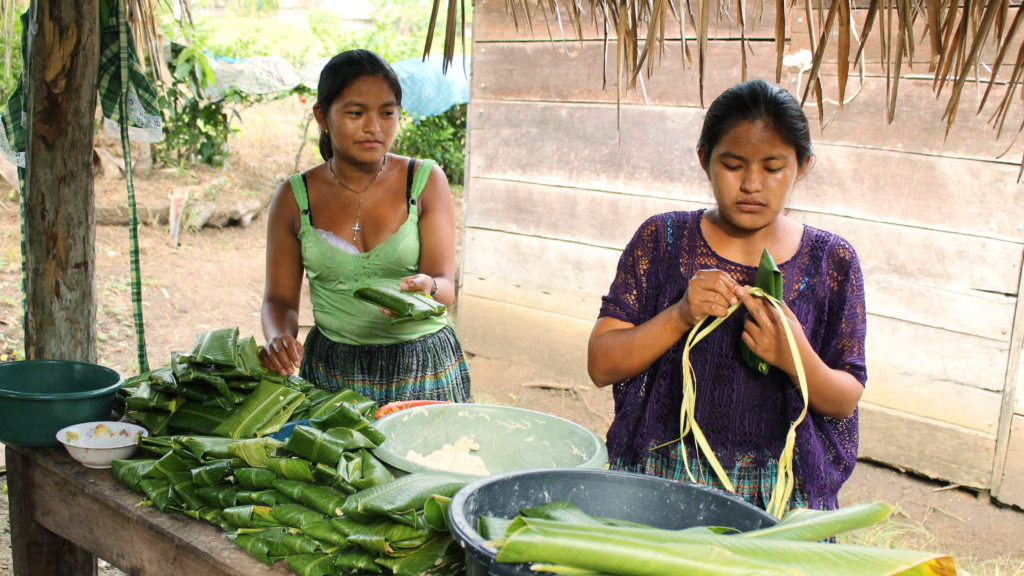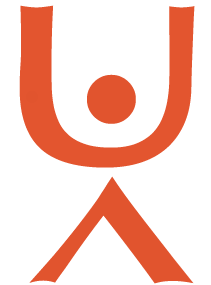Hilda Cac Mez of Santa Cruz el Nacimiento, Guatemala joined Trickle Up’s program shortly after her younger sister, Flora Adelaida. Hilda was attending savings group meetings to support her sister and showing up in her place when Flora was unable to attend. Field staff noticed her motivation and thought she should be included in the savings group as well.
Hilda, at 17, is the oldest of her six siblings. In addition to Flora, 15, she has three other sisters and a brother. Her father grows corn on their three acre family plot and also works as a wage laborer. Because of this, they can prepare and eat tortillas year-round, and supplement with rice, noodles, beans, potatoes, and carrots. They will also occasionally hunt for jutes, a freshwater snail that lives in the river across from the community. Hilda is sometimes offered wage labor to clean other families’ lots or harvest their land. She also helps her mother prepare and sell tamales, a typical Guatemalan food of corn stuffed with meat and wrapped in banana leaves.
Hilda is a smiling young woman who loves to joke. Even though she’s graduated from third grade, she would like to keep studying. She doesn’t know yet what she wants to be or what her goals for the future are but she knows she’s looking forward to what is to come.

After joining the Trickle Up program and Flor de Santa Cruz savings group, Hilda decided to sell children’s clothing for her new business. She received training on how to get it off the ground, set prices for buying and selling goods, and keep financial records.
She invested her $75 seed capital to buy the initial stock of clothes, and her parents invested an additional $125 in products for Hilda to sell. In the end, she included clothes for adults, güipiles (typical women’s blouses), sneakers, and bras. People from her village, Santa Cruz el Nacimiento, have to go to another community, Las Promesas, to buy their clothes, so Hilda saw an opportunity to reach an untapped market. She also heeded her mother’s advice, “Clothes won’t rot or go bad.” Hilda will never have to throw out any of her inventory if she has a bad week and isn’t able to sell all of her products.
The family works together to sell clothes in Santa Cruz el Nacimiento and neighboring communities. With the money the business generates, they also pay for bus fare and food when they have to travel to sell their wares. Hilda’s family has divided up the sales and travel schedule: Hilda sells in the community once a week, while her parents go together to sell in another, more secluded community every two weeks. Hilda and her parents have segregated their products, so when Hilda sells the clothes that her parents bought, she gives them the transaction records.
Because of the poverty of all these communities, some customers ask to buy clothes on credit and pay Hilda back slowly. She is aware that this represents a risk; however, she argues: “If they do not pay, they will be shamed. Also, if someone does not pay, I would not continue selling to them.” So far, she’s been getting along well with her customers and sees that her relationship with her community has changed. Before, she only saw her neighbors at the river when she went to fetch water. Now she visits them to offer her products and they talk and laugh together. Hilda would like to see her business grow; she wants to sell clothes in Ixcán, the nearest city, so she won’t have to walk in the hot sun from house to house anymore.
Hilda made $163 in the first quarter, and $166 in the second. The revenues from this family business helped cover family expenses, but Hilda also earns her own income, which she uses, among other things, to save.
Hilda took a turn as the keeper of the lockbox for the savings group. She told us that she sees several advantages to being in a savings group: “If I had the money on hand, I would have already spent it. Also the group has benefits: it gives out loans and the money earns interest.” Before, she didn’t save; it hadn’t even occurred to her. In less than a year, she saved $27.50 from the money she made selling clothes and washing clothes for other families. She likes the idea of pooling this money together because she knows that it will be useful: “If there is scarcity at any time, this will help us.” She hopes to save a lot and then invest the money in her business.
Hilda feels like the group gets along well, despite some minor conflicts, which they are trained on how to resolve. In the group, they also get advice on postponing marriage and on their personal goals and futures. Hilda has also learned about sexual and reproductive health; she’s learned that the development of women is different from that of men, and she has learned how to better take care of herself.
Hilda told us she is happy to be part of the Trickle Up program. Before, she didn’t hang out with the other girls, would never have started her own business, and didn’t have any savings. She reflected on her current freedom and independence in comparison with her mother, who at her age already had a husband, baby, and other responsibilities. Hilda said: “I don’t have this kind of commitment but instead get involved in what I want.”
Two months ago, Hilda went to work for a family in Cobán after being recommended for the job by her relative, the family’s previous domestic worker who got married and left the position. Despite her departure from Santa Cruz el Nacimiento, her sister Flora Adelaida and her parents did not stop the new business Hilda started.

Selling clothes has become a family business. Flora and her siblings sell clothes in Santa Cruz el Nacimiento, Las Promesas, and San Marcos twice a month. Their father travels weekly to several more distant communities. In the enterprise’s third quarter, they earned $268 in profits and $504 in the fourth quarter. After the first year, they had generated $1,101 in total earnings. During the lean season, when entire communities are going hungry, they can only earn about $50 daily. But during the corn crop, business picked back up and they managed to sell between $88 and $150 each day. In just one year, they increased the working capital of their business to $500 from an initial $200 ($75 from the Trickle Up seed capital and $125 from the parents’ investment). With their profits they have been able to pay for the children’s education, afford healthcare and medicine, eat more nutritious food, and buy fertilizer for their small farm.
Flora and Hilda’s family had a business once before, but because they lacked knowledge on how to manage it well, they lost it. Today, their father Julio Cac Sacul says, “There have been many changes. In previous years, we had no money, not even for food, but with the business we’ve increased our income can now buy food, including meat. This past week, I worked entirely on selling clothes. There was work available at the palm company, but it’s more difficult and pays less.” Flora and Hilda’s mother said: “For us the business is another support for the home. Before, we depended on the income of my husband’s work and we only had enough to buy basic necessities. When I was Hilda’s age, it was very difficult for me: my dad died and we didn’t have any opportunities. We lived in extreme poverty, depending on the income of my mother.”
At the end of the first savings cycle, Hilda received $29 and Flora $24 from their savings and accrued interest. Hilda, having already left for Cobán, didn’t continue in the savings group the second year. Despite having also chosen to leave the group, Flora took $19 in loans from the savings group, which has helped her invest in her business.
Flora notes that she is no longer ashamed to go out of the house to sell clothing. Some communities even know her already because she has gone there to sell before. She tells us: “The business is very good. In times when there is no money, the business helps cover household expenses.” In addition, she says that through the trainings she has learned how to be healthy, how to avoid pregnancies, and the risks involved with pregnancy.
Flora and Hilda have gone through profound changes over the last year, which will help these two young women continue to expand their income sources to create sustainable livelihoods and brighter futures.



